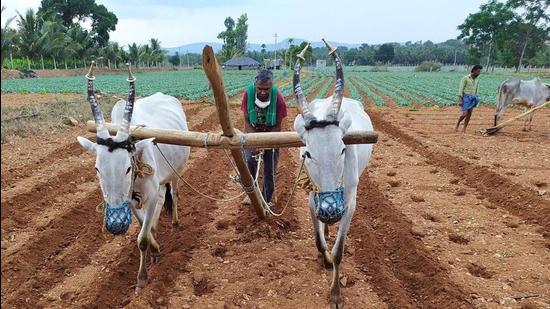Farming on fallow lands to get boost
State agriculture minister MRK Panneerselvam presented the budget in the assembly on the day the DMK government completed 100 days in office. A sum of ₹34220.6 crore is provided for the demands of the agriculture and its related departments for 2021-2022.
Tamil Nadu tabled an exclusive budget for agriculture on Saturday, a first of its kind in the state and a key initiative is to bring 1.18 million hectare of fallow land into cultivation.

State agriculture minister MRK Panneerselvam presented the budget in the assembly on the day the DMK government completed 100 days in office. A sum of ₹34220.6 crore is provided for the demands of the agriculture and its related departments for 2021-2022.
The state has carried out preliminary surveys in 36 districts where currently an area of 1.93 million hectare of fallow lands has been identified. “Fallow lands are the next level of hope to expand agriculture in Tamil Nadu,” said Panneerselvam. “Area under cultivation will be increased by making the fallow lands into fortune lands.” The scheme will be implemented in 2,500 village panchayats in the current year.
By increasing cultivation areas, augmenting water resources and other measures, Panneerselvam said his budget’s aim is to achieve overall agricultural development and self-sufficiency in all the villages of Tamil Nadu by collaboration with allied departments. This will be implemented under a grant scheme -- Kalaignarin Anaithu Grama Orunginaintha Velaan Valarchi Thittam -- named after DMK patriarch and five-time chief minister MK Karunanidhi. The scheme will be implemented annually in one-fifth of the total 12,524 village panchayats in Tamil Nadu with an aim to cover them all in the next five years.
Experts are of the opinion that bringing back fallow lands into cultivation is feasible but say that the execution should be comprehensive. “If the farmer has kept a land fallow for less than two years, it can be easily brought in because it would have been kept fallow for specific reasons during that particular year mostly due to insufficient water supply,” says R Gopinath, senior scientist, MS Swaminathan Research Foundation (MSSRF). “But older fallow lands require more effort as many of these are in the hands of small and marginal farmers, so they cannot spend on irrigation and land development activities.”
He says that it’s also important to know what kind of crops they’re going to cultivate. “The intervention should be throughout the life cycle of the crop,” says Gopinath. “Even if the fallow lands are in rainfed regions, you can use rainfed crops by providing adequate support in all aspects. If the government offers packages which include seed, money for land preparation activities and input subsidies and help them market, it will boost farmers to bring those lands into cultivation.”
The state also has a vision to achieve food and nutritional security in the next 10 years. As paddy is the principal crop in Tamil Nadu, a special paddy production plan is in place to cover an area of 1.9 million hectare with an aim to achieve the production of about 7.5 million metric tonnes. Contending that indiscriminate use of chemical fertilizers and pesticides have affected soil fertility, environment and affected people’s health, the Budget highlighted that there is awareness among people giving momentum towards the demand for organic produce. A separate wing for organic farming will be established within the agriculture department. To encourage farmers, the government will give input subsidies for adopting organic farming.
Addressing another healthy eating food, the budget points out that in Tamil literature people had relished millet flour with honey. But with the increase in the consumption of rice, millets are gradually disappearing from the native soil as well as in rural homes. This is seeing a reverse once again as people are replacing rice with millets and there are exclusive restaurants for millet based food. “Millets and minor millets can be cultivated with minimum inputs,” Panneerselvam said. Millets can grow well even in low rainfall areas and the farmers will be given training to cultivate millets and facilities will be provided to market their produce. The government said that it would award the best performing farmers in organic farming, exporting produce and also local inventions in agriculture.
Agro Industrial Corridor in Cauvery Delta Area
The Cauvery delta area covering five districts -- Thanjavur, Tiruvarur, Mayiladuthurai, Nagapattinam and Trichy -- will be declared as an Agro Industrial Corridor. This is to promote agro-based industries by plugging infrastructure gaps, creating new industrial infrastructure and by attracting private investments to the region, Panneerselvam said. Rice, pulses, banana, and coconut, among others, are produced throughout the year in this region. The government will take the help of the micro, small and medium enterprises (MSME) department to improve the existing industrial estates, create new industrial estates, improve road connectivity to have better linkage with markets and ports and to augment power supply infrastructure.
“The current facilities available are only to harvest and sell grains and agricultural produce immediately. But this move facilities value addition,” says Gopinath. “For instance, paddy stock can be converted into a product, and pulses which are declining in this area can be promoted through industries. It can also be turned to reduce input cost of farmers and bring them better incomes through these value-addition activities.”




